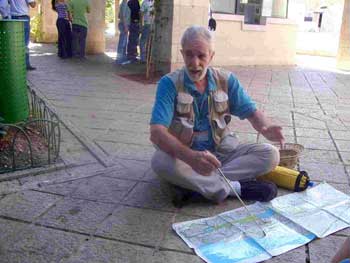TOURING LETTER NO.1
For individual travelers, (families and small groups in my van)

OPTIONS
Before you commit yourself to travelling with me, it may be useful to know that you do have other options; there are any number of ways of touring Israel. Most people come on group tours. That is an easy, economical and efficient way to do things. So you can join (or organize!) a synagogue or church group, and come that way. I often guide groups like that.
Then there are pick-up groups. The people come from all over, each having bought a place on the tour. It takes a while till the internal dynamics of the group get worked out, but then it can also be very satisfactory.

Adventurous (and poor) souls come alone. College kids wander around and make friends and hang out and get by. Serious types take the Regular Tours; daily walking tours of the Old City (there are lots of them), bus trips offered by one of the big companies (one day Massada, two days Galilee, one day Old City, etc.) This is by far the cheapest way to travel with a guide. How good it is depends on the guide. Some of the people doing the Regulars are first-class guides who for a variety of reasons can't take a lot of time away from home. Others aren't.
Finally there are those who travel with a private guide; that is the serious (and most expensive) way to go. Most of my work is of this nature. I meet my clients at the airport, worry about them as much as they want to be worried about, arrange their itinerary, fix their hotels if they want me to, and stay with them till they're done touring or until they leave the country. Here's how that works:
TRAVELING WITH ME

Whether in fact we travel together depends on the usual two considerations: time and money. My time gets booked up in advance so the first thing to do is to suggest dates so that I can check my calendar. In the worst case, if I'm not free, I put you in touch with a colleague; there are a half dozen guides whom I recommend without reservation, and we pass work to each other when the need arises.
1. MONEY:
The financial part of the trip works out as follows:
- My daily fee is $650 a day. This for me and the Guides' car/van which I need to rent according to the size of the group.
- "The car" includes gas, parking, and 200 km a day driving, averaged out over the whole trip. If we drive more than 200 km a day (it doesn't often happen), I bill you $1. each extra km.
- The rate does not include entrance fees.
- You need to pay for my hotel bill when we are out of Jerusalem. I must charge you for overnights in Tel Aviv during the trip whether or not I actually sleep there.
- I can happily eat in the hotel at night. Going out for dinner when we're away from Jerusalem (I know a lot of good restaurants!) is way beyond my budget, however, so you end up inviting me if we go out together.
- The best way to pay me is by personal check.
2. ON TIPPING:
While we are on the subject of money, I need you to know at least one rule. When we have a separate driver (not me), he needs to receive a tip at the end of the trip. $5. per person per day is an acceptable sum.
3. ITINERARY:
You will want to plan your itinerary carefully. Allow me a word of advice on this matter; it's true that my advice is also self-serving, but it is good advice nonetheless. The temptations to add things on to a trip to Israel are almost irresistible. As long as you've come so far from home you may as well do a bit of Europe, and Egypt and Jordan are close by, etc. etc. My advice is to try to resist this temptation. When you squash too much into any one trip you find yourself running breathless from place to place, not in control of your time or your wits. In my business we call it the "It’s-Tuesday-it-must-be-Belgium" phenomenon. And the problem is especially critical when travelling with kids. So unless you're going away from home for a long time (more than 2 weeks), which most people aren't, be careful what else you add on. It can be physically and emotionally counter-productive.
As for the itinerary itself, ideally, a trip to Israel should be about 10-11 working days, with a day or two extra for private time, shopping, etc. The rule about making itineraries in Israel is to THINK CIRCULAR. Spend half your time in Jerusalem, two or three nights near the Sea of Galilee and another night on the Mediterranean near Haifa. The last day or so you can spend in Tel Aviv. That way you avoid long driving and cover the country nicely. In list form, the standard itinerary looks like this:
- Day 1. Arrival. Go to Jerusalem
- Day 2. Jerusalem - Old City in the mornings, New City in the afternoons.
- Day 3. Jerusalem II
- Day 4. Jerusalem III
- Day 5. Massada and the Dead Sea
- Day 6. Sleep, shop and goof off (best when this day falls on Shabbat)
- Day 7. Jericho by-pass, Jordan Valley, Beit Shean. Sleep near the Kinneret
- Day 8. Kinneret area, Safed
- Day 9. Upper Jordan valley, Golan
- Day 10. Zippori and the Western Galilee. Sleep in Haifa
- Day 11. Megiddo and Caesarea. Sleep in Tel Aviv
- Day 12. Tel Aviv and area
- Day 13. Departure

Add a day flying at each end, another free day in the middle and you have a block of 15 days, which is your basic framework. The above is a fairly standard (if limited) itinerary. The only radical change that gets made in such a schedule is a trip to Petra, which means Eilat and the Negev, in which case everything has to be re-arranged. I like going south with people who have been here before, but don't really recommend it for first timers, unless they have LOTS of time. And never in the summer.
It is possible, however, to shorten or (especially!) to lengthen the time, or to do this itinerary backwards - starting in Tel Aviv (which actually works out very well in most cases). All the time remembering that it's only a framework; if we find special interests and go bird-watching at 5 AM, or the weather is too hot and we decide to goof off and go swimming, or we're feeling terrific and want to walk to a Crusader castle, or feeling lousy and want to sleep, there's no reason why we shouldn't do as we please. We're not accountable to anybody but ourselves.
4. HOTELS:
I (actually, my wife is the expert) can book hotels for you. We do this after we have agreed on an itinerary so we have firm dates for each place. My hotel room is your expense. We do need to be in touch with each other about hotels before booking anything (if you are booking rooms yourself).
5. LUGGAGE:
This is a controversial subject, but I'd like to really encourage everyone to travel LIGHT. Israel is an informal place; you need very few clothes. It will not rain if it's not winter, and you are not likely to be invited to dinner with the President of the State. Nobody needs a tie or jacket or fancy ball dresses. Only one nice thing for Shabbat, and simple clothes for the rest; jeans, shorts, a bathing suit, a hat (unless you're coming in mid-winter, EVERY MEMBER OF THE GROUP MUST HAVE A GOOD SUN HAT), a pair of sneakers you can walk in -- please do NOT bring new shoes! -- clogs/shower thongs for the Dead Sea (really important!) -- at most one medium suitcase per person. I can't tell you how awful it is to have to load a mountain of suitcases in the car every morning. I've done it, too often! So please, make everybody go easy with the luggage.
6. EGYPT AND JORDAN:

I personally think Egypt and Jordan are terrific, and very much worth 5-6 days for Egypt and 3-4 days for Jordan, if you can spare the time. But that is a big "if"; I absolutely do not approve of squashing Israel just to manage a day or two of Jordan. It's bad for me, bad for the group, and bad for Jordan. We like both countries very much--they are only a bus ride for us--and we've been any number of times. But I would only go to Egypt in mid-winter; it's very hot there other times. If you do decide to visit Egypt, make the trip before Israel, not afterwards. That's really good advice, based on years of experience. You can put Jordan anywhere in the Israel trip, provided you make extra time for it.
7. BANKING:
Here is more good advice. There is no longer any reason to bring money of any sort to Israel when you come. Not cash or Travelers Checks. The secret is to bring your ATM card and to know the PIN (which must be 4-digits only) to any bank (or most banks!) in the country and just take shekels out of the wall. No long lines, very good rate of exchange, and no commission. Easy as that. As long as your card is either Cirrus, Honor or Plus and the PIN number is right, it will work. Guaranteed.
You can also get cash with any VISA/MASTER card, provided you know the PIN. The disadvantage is that VISA may charge you interest for a cash withdrawal, whereas your own ATM doesn't.
8. YOUR WALLET:
Most people live with a ton of stuff loaded into their wallet. But wallets and purses do occasionally get lost or stolen. And the money is usually the least important of the losses. So the smart move is to leave at home everything you absolutely don’t need: extra credit cards, museum passes, store cards, memberships, bus passes, drivers licenses, opera subscriptions, charge cards, etc. etc. All the stuff you really don’t want to lose should stay at home when you go traveling.
9. THE CAMERA:
In my experience, 99% of everything that ever went wrong on a trip concerned the camera. It got broken (I know where there are labs to repair cameras), or it doesn't work the way it should because the traveller doesn't know how to operate it. Therefore, my firm advice: if you bring a camera along, especially a new one, be sure to bring the Instruction Manual also, so we can together try to figure out what's going on.
10. COME EARLY IN THE WEEK:
I have been making itineraries for many years now. And have come to the conclusion that it is definitely better to plan to arrive in Jerusalem early in the week. Leave the USA on Sunday/Monday, arrive the next day, spend a few days learning your way around the city, and then it’s ok to take a day off for Shabbat. Otherwise, people who arrive on a Thursday or Friday find themselves lost when given a free day for Shabbat.
11. CELLPHONES:
Be sure your cellphone will work. Many of them do, but I have found that others, especially new and fancy iPhones, etc. don’t/won’t. So if you are planning on bringing a cellphone with you, check with the local dealer that it is unlocked, so you can change the SIM card if necessary, and/or that it will work in Israel. You can order a cellphone from your home via the internet, if you choose. Alternatively, I have a spare pre-paid cellphone which you are welcome to borrow for the duration of the trip.
 IN CONCLUSION
IN CONCLUSION
A long letter! Hope this gives you enough food for thought and planning. Write soon if you want to travel so that I can hold time for you. Feel free to phone me at my US direct phone: (321) 251-4744 or by e-mail: walterz@netvision.net.il.
PLEASE NOTE
I will require a deposit of $300. to hold time, once you decide it's a go. Thank you for finding me and for your patience in reading. With best wishes,
![]()
Home | About | Tour Israel | Newsletter | Lecture Topics | Links | Contact